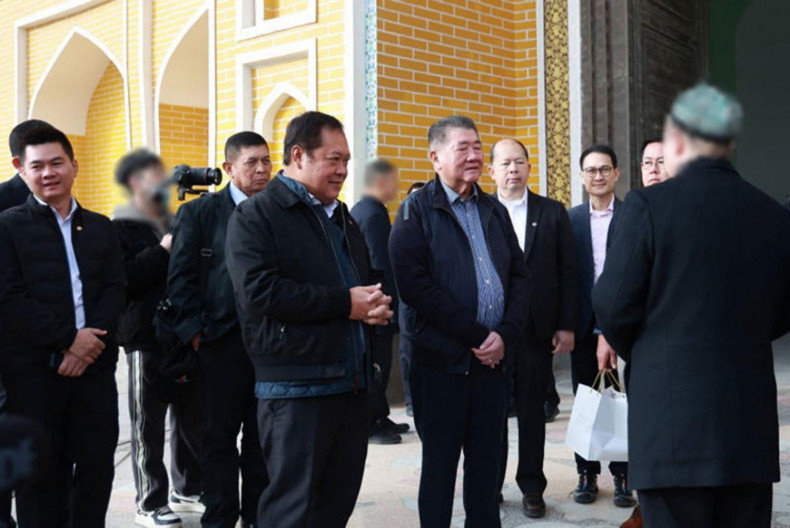Deputy Prime Minister Phumtham Wechayachai and Justice Minister Tawee Sodsong meet with the Imam of the Id Kah Mosque in Kashgar, during their visit to the East Turkistan to follow up on the status of Uyghur returnees on March 20. (Photos: Government House)
On the night of February 27, the Thai government deported 40 Uyghur refugees to China after holding them in detention for 11 years. This decision has drawn widespread international condemnation and now threatens Thailand’s ongoing negotiations for a Free Trade Agreement (FTA) with the European Union (EU). According to a Bangkok Post report, Thailand's Economic Development Committee is working with the Ministries of Foreign Affairs and Commerce to assess the potential impact of the deportation decision on Thailand’s international trade relations.
Sittiphol Viboonthanakul, Chairman of the Economic Development Committee, noted that the deportation may negatively affect Thailand’s international trade dynamics, particularly with the EU. However, the full extent of the repercussions is yet to be determined. Sittiphol stressed the importance of evaluating whether this incident will delay the signing of the FTA with the EU or hinder Thailand’s efforts to join the Organisation for Economic Co-operation and Development (OECD).
In response to the deportation, the United States announced visa restrictions for unnamed Thai officials involved in the decision, while the European Parliament passed a resolution condemning Thailand's actions. Human rights groups, including Human Rights Watch, have strongly criticized Thailand's policy of deporting Uyghur refugees.
During discussions, representatives of the Thai Chamber of Commerce (TCC) defended Thailand's adherence to international human rights standards. They highlighted the country’s efforts in addressing global issues such as illegal fishing over the past decade. TCC representatives also emphasized that deportation is a globally common practice, citing similar cases in the United States and Europe. They argued that the deportation issue should not be included in FTA negotiations.
Uyghurs in Thailand Considered a "High-Risk" Issue for China
An American researcher specializing in Chinese studies, Adrian Zenz, told a panel at the Foreign Correspondents Club of Thailand on Wednesday night that China considers Thailand a "high-risk country" regarding Uyghur and Xinjiang-related issues. According to Zenz, Uyghurs who traveled to Thailand on valid travel documents were arrested upon returning to China due to concerns that they had been exposed to extremist ideology during their time in Thailand.
"Those returned from Thailand faced re-education," said Zenz, Director of Chinese Studies at Washington DC-based Victims of Communism Memorial Foundation, speaking via Zoom. He cited leaked internal documents from the Xinjiang Police, which detailed how four Uyghur men had faced re-education after returning from Thailand over the years. Thailand is among 26 countries, including Malaysia, Indonesia, and the United Arab Emirates, where Uyghurs are subject to this kind of scrutiny.
The internal documents, translated into English, revealed strict instructions for handling Uyghur returnees. "For those returning from abroad, catch whoever returns, detain whoever is caught, imprison whoever is detained, and let none slip through," the document read. It further emphasized, "For those whose circumstances are unclear, perform re-education, but they must not be released."
Despite international backlash, Thai officials recently visited Kashgar in the Xinjiang (East Turkestan) region of China. During this visit, they claimed that China has treated the returned Uyghur refugees well. However, the impact of this diplomatic trip on ongoing FTA talks with the EU remains uncertain.
Dilshat Sultan
28 March 2025

